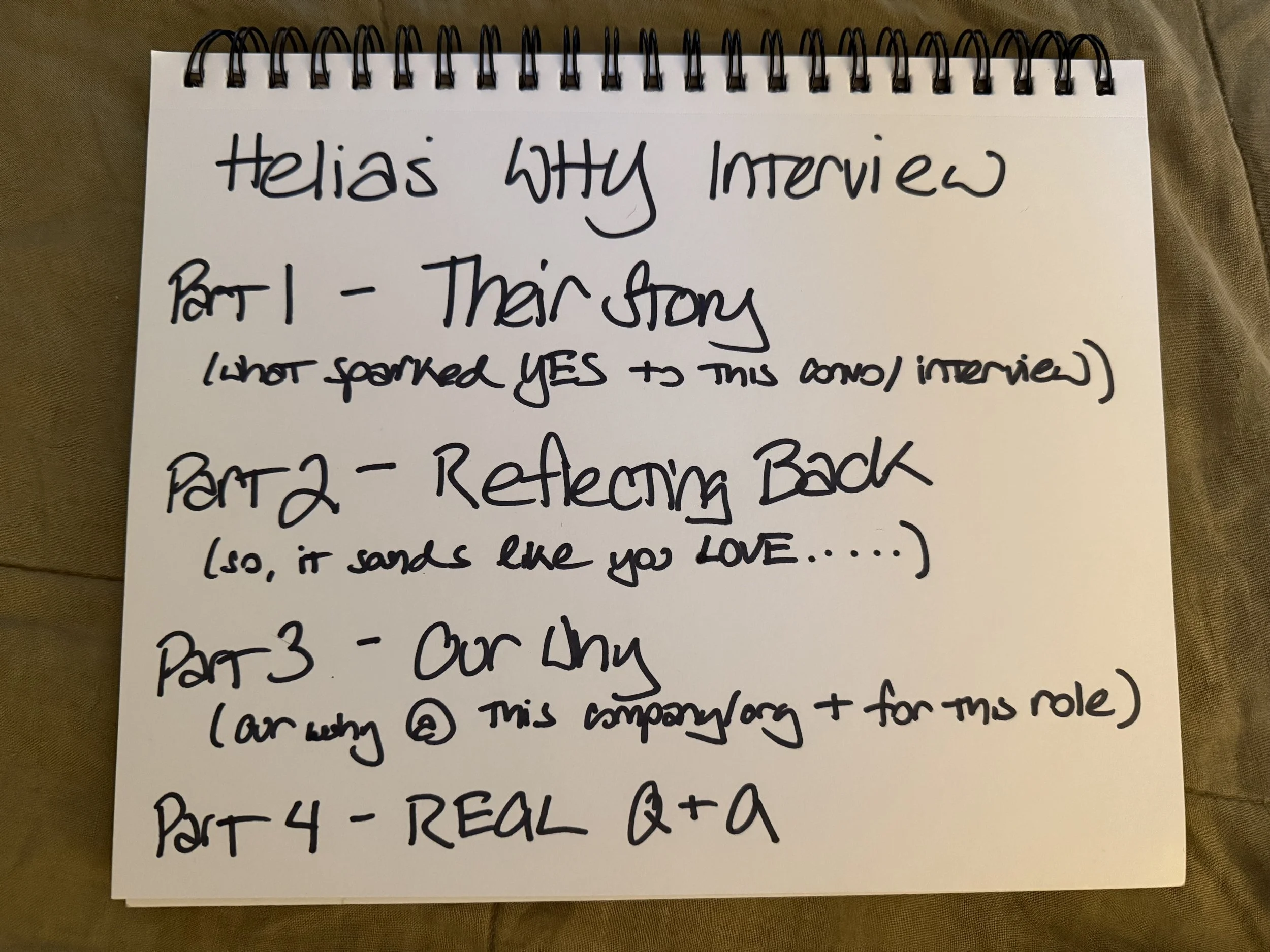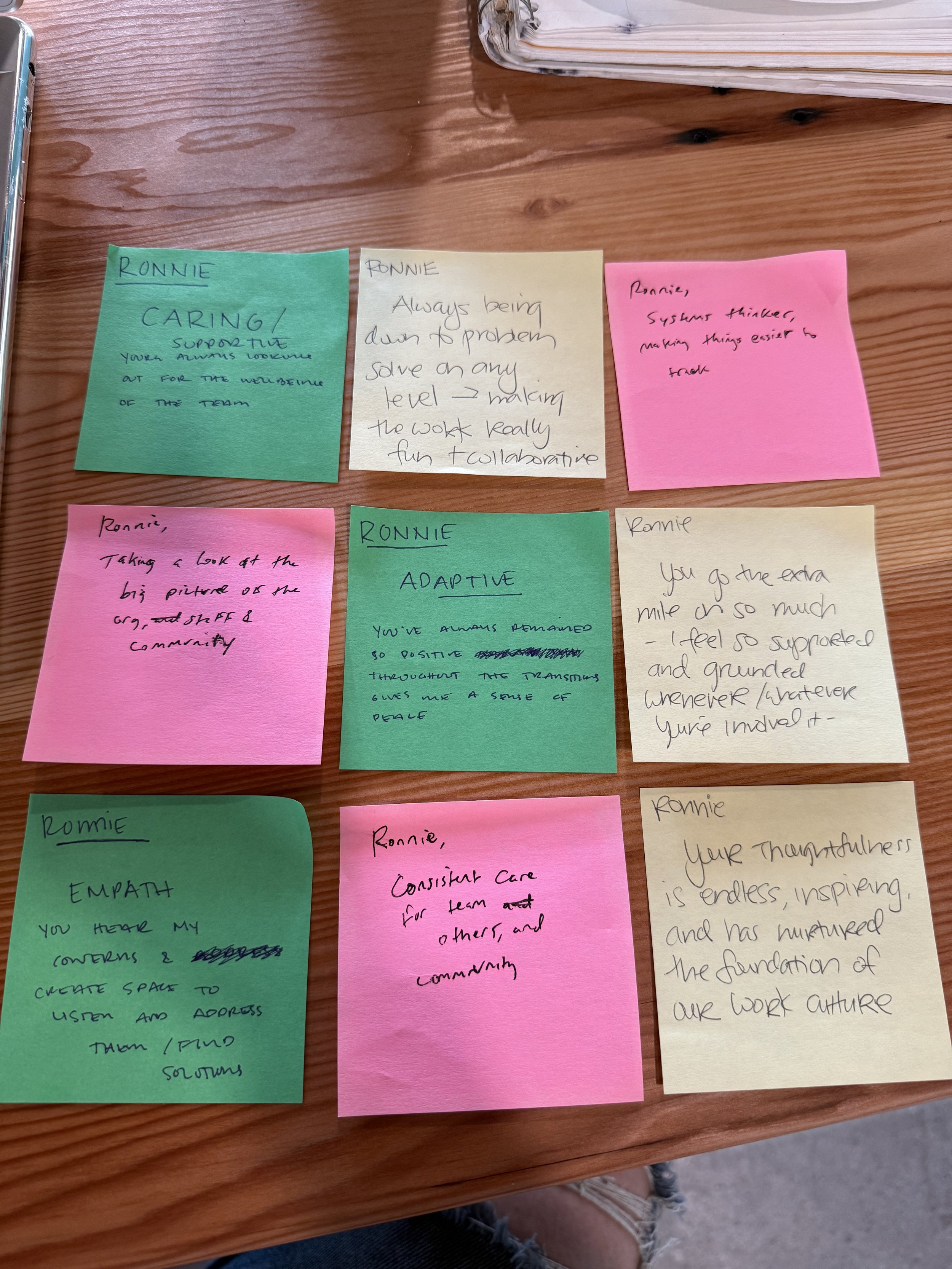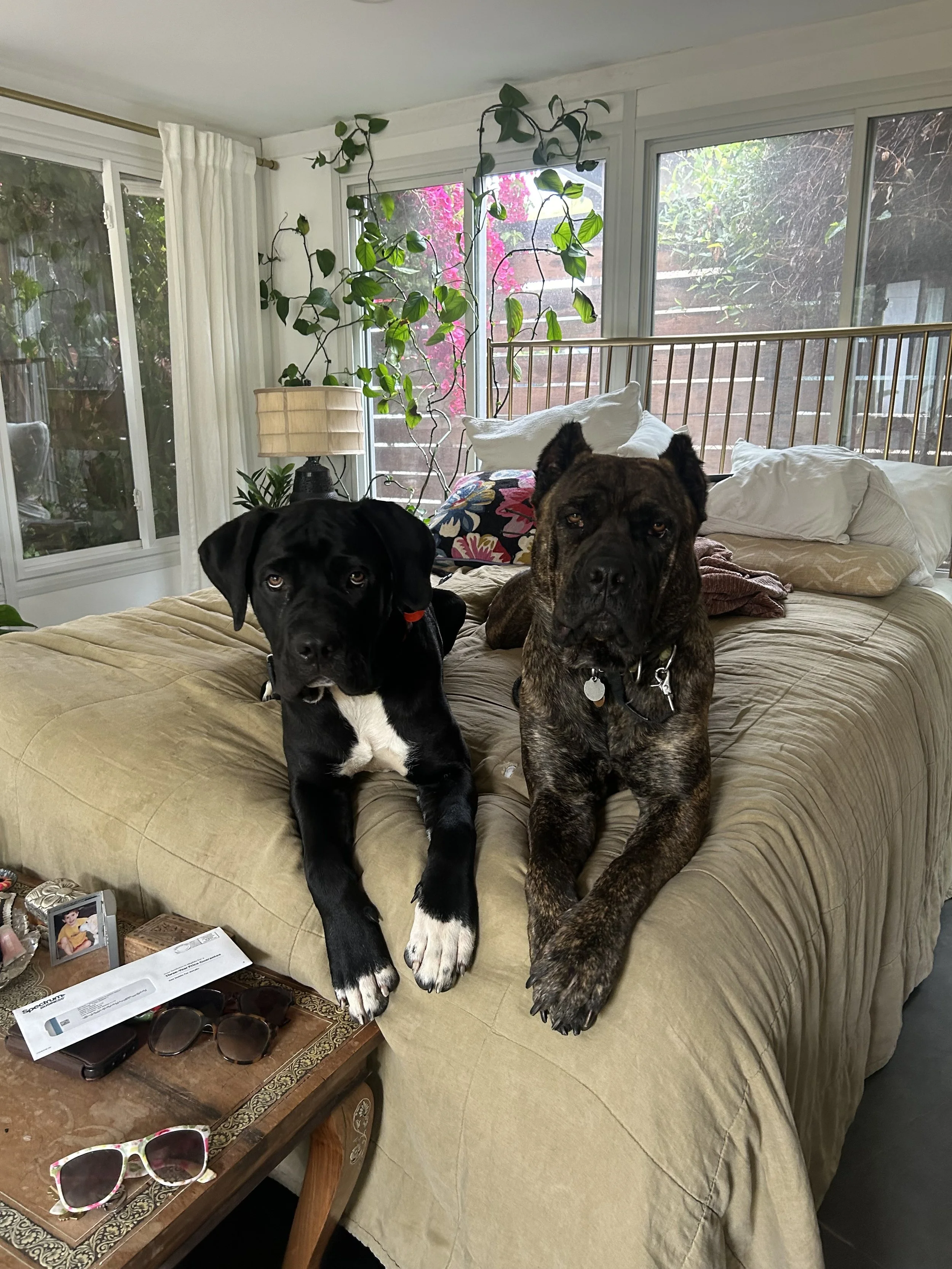The Why Interview: Getting to What Really Matters
Part of Helia’s Interview Series
Summary:
The Why Interview is your recipe for finding folks who'll truly thrive at your organization. This focused early-stage conversation digs beyond skills and experience to uncover a candidate's true motivations and alignment with your mission. Instead of just checking boxes, this approach helps both you and the candidate figure out if this is truly a YES before investing more time in the process.
What’s in it for you:
You want to build teams where folks aren't just capable, but genuinely excited about the work they'll be doing
You want to reduce costly hiring mistakes and the painful exits that follow
You need a conversation-based approach that helps both you and candidates make better decisions
Helia’s Perspective
Every time I've hired for skills over the "why," it's been a mistake.
Which is why I LOVE the Why Interview – hiring the humans that want the job that you want done, where you can see what they like. Someone who's built before and wants to do it again versus someone who's built before and wants to execute. Someone who LOVES managing versus someone who wants to get something across the finish line and will manage – these are different!
After hundreds of interviews, I'm convinced that understanding someone's "why" tells you almost everything about fit. The perfectly polished answer or incredible assignment matters - but ensuring underlying alignment from the beginning is crucial. When there's a mismatch, everyone spends too long trying to make it work, or it ends in a hasty, painful exit.
While at TOU, we were scaling up and I learned quickly that we didn't want folks who wanted to fix what we were doing but those that wanted to help. And no one who was bringing in a "this is how it's done" but rather a "let's see what's needed and how we can best respond." Most definitely not a perfect strategy – and by adding in the Why Interview as the first or second interview, I could immediately identify who was worth the time to engage with and where there was alignment.
At Rev Foods, we had the most awesome range of folks not because they'd all worked in ops or customer success but because they wanted to be part of building something and saw this as a place to do it. We were fast-growing, iterative, and responsive – we needed folks who loved responding to challenges and were very flexible. At the same time, for our nutrition + compliance team (including folks entering nutrition data for each meal daily), we needed people who LOVED structure and detail AND didn't mind shifts happening around them. It's rarely all one thing – skills can be learned, but the why they want the job needs to align for there to be success in any way!
We waste so much energy when the "why" isn't aligned from the start.
This is most definitely not perfect. How do you create space for authentic conversation in a process that candidates know they're being evaluated in? How do you get past the performance to the real person? The Why Interview doesn’t solve all these things AND it's the closest I've come to consistently hearing what I actually need to know.
What This Looks Like in Practice
-
The Why Interview happens VERY early (think first or second round) and is done by someone who's really good at interviewing and who's comfortable with genuine reactions and off-the-cuff conversations. Often the hiring manager works great for this role. The purpose: make sure the Why is a brilliant YES before taking one step further.
Before you start, make sure you're clear on who you're looking for – both for the role AND for your organizational culture. You need to have a clear sense of this so you can actually hear the Why when someone shares it.
-
I literally start every Why Interview the same way:
I'd love for you to introduce yourself – you can either walk me through your resume OR tell me a few stories. What I really want to hear is what sparked you enough to say YES to this conversation about our organization and this role in particular.
Then I shut up and listen. Seriously. Let them choose their path. It's fascinating what folks will choose to lead with!
What I'm really listening for
This is where the magic happens. I'm paying attention to:
What they lead with (tells you what they value)
Where their energy changes (that's the real stuff)
What they emphasize (what they're proud of)
What they skip over (sometimes even more telling)
I've had folks talk about their dreams, complain about past roles, walk me through their resume bullet point by bullet point, or even introduce themselves like we're on a first date. What folks choose to talk about – and how they do it – is wildly telling.
What I hear from them is who they are, what they're proud of, and what's exciting them about this work. Are they a builder who's proud to have built and now looking for their next challenge? Are they an idea person who passes things off – or an idea person who wants to be in on every detail? Or perhaps NOT an ideas person, but someone who likes to make others' dreams come true?
-
After they share (which I let go on as long as they'd like!), I always reflect back what I heard:
So it sounds like you really love building things from scratch, you get excited about mentoring others, and you're looking for a place where you can grow into leadership. Did I get that right?
This does two things: makes sure I didn't misread anything AND gives them a chance to say "actually..." Here's the beautiful thing about this reflection moment – when candidates feel seen (like ALL of us!), it often opens up a whole other realm. They get excited and open up further – "yes and here's why," "yes and also," "yes but what's really happening is..."
-
Now I talk about the role – including some customization based on what I heard. If someone mentions that they love building things, I share specific examples of what we have and what we need. If a candidate talks about perfecting systems, I describe our vision of a perfect system – and how close (or far!) we are from achieving it.
This approach helps both me and the candidate see beyond checklists of qualifications to transferable skills and authentic motivation.
-
Finally, I invite their questions – and I encourage their FULL HONESTY here. I usually say something like:
"I know this is an interview and that brings with it all the expectations and how we need to perform... AND for every hire I make, I want the candidate AND our organization to be screaming 'YES!' What do you need and want to know to help give you the clarity for that? I want any and every question you've got and will answer as honestly as possible so we're both making great choices here."
The questions folks ask often highlight what their priorities are. Do they go deeper on the examples I shared about the role? Do they focus on work and life balance? Do they care more about the work they're doing or the folks they'll be working with?
-
I always ask candidates to reflect after our conversation and get back to me in 24-48 hours with whether they're screaming yes. Alignment on this is a must – and it's an opening for more questions, of course.
When you get this right, it creates the MOST beautiful teams. Even with vastly different styles (big dreamers that want do everything and thoughtful introspectives that move slowly), if their why matches the org AND their role (big dreamers = visionary leaders and thoughtful introspective = director of operations), they will usually LOVE working together as we can see for the accolades for this thoughtful introspective who’s big dreaming colleagues love and appreciate what he brings!!!!
Real examples of this working
The Why Interview has told me everything I needed to know to make some unexpected but brilliant hires:
A Target store manager → School Food Sales and Account Manager
I hired a sales manager who was most recently a general manager of a Target store (and previously a researcher for a law firm) for a school food Sales and Account Manager role. Why? Her diligence, integrity, and understanding of how humans worked would translate into understanding customers, what they needed, and how to flow that through the operational realities in the business.
A national funder's External Affairs lead → Head of a Lived Experience research center
I hired a leader of a national funder's External Affairs team to run our national research and legislative work. Why? They loved fitting all the pieces together and understood the power dynamics.
A fashion industry project manager → Non-profit communications department
I hired a project manager with a background in the fashion world to take on a non-profit's communication department. Why? They understood how to make all the pieces fit together and would have a different eye, especially from a world that is so visual and with a million different pieces.
I know - a random dog photo!!! And we got REALLY clear on why for the second pup, needed to play wildly well our first (there’s nothing that can tire a dog out like another dog and we couldn't keep up) AND we wanted a dog that would snuggle and be a little more loving than our I want to be right next to you and will protect you in all things but please only touch me when I want to be touched. The specifics shifted (size, age, etc.) but the why our family needed a second pup were a YES the whole way through!
Secret sauce & takeaways
The Why above all else: When a candidate's motivation aligns with your needs, other gaps can be bridged. Misaligned motivation can't be fixed.
Energy shifts tell the story: When does someone light up? When are they going through the motions? These moments often open the door for the real conversation.
Reflection creates connection: When you mirror back what you heard, candidates feel seen – and that's when the real sharing happens.
Let them choose their path: How someone introduces themselves tells you what they value most.
Think beyond today: Hire for where you want to be in 1-3 years, not just immediate pain points.
Questions reveal priorities: What candidates want to probe tells you what matters most to them.
Questions to ask yourself
Here are some questions you might want to sit with after reading this...
What work patterns, approaches, and styles actually succeed in our organization right now? What can we give to folks in terms of support? What do we need from new team members?
When did I hire against my gut feeling, and what happened? (Hint – mine have all been serious learning lessons!)
How often do my interviews reveal someone's genuine "why"? How might I create more space for candidates to show who they really are?
What questions am I asking that actually get to motivation versus just checking boxes?
Want to Try This?
Templates & Guides:
Check out Helia’s Why Interview Template – the actual conversation guide and reflection prompts I use
Be sure you're hiring for the right role! Right Role at the Right Level, Designing the Right Role Worksheet, and the Common Roles Reference Guide
Looking for sample questions that communicate your culture? Review THIS list of competencies alongside your organization's core values.
Recommended Reads:
To think through the type of people who will thrive in your culture, Helia has a few other thoughts in our Interview Series: Identifying the Humans Who Will Thrive and the Finding Your People Worksheet
Hiring with Heart and Strategy: A Process That Works – Sophia Zisook's systematic approach to creating equitable hiring processes that actually works, especially for small organizations
Have a person or org you recommend for interview help? Tell us about it!
Connections:
FitzRoy and Associates - if you want a recruiting partner that gives you incredible attention and helps you identify and find exactly who you’re looking for (versus a search firm who amplifies in their rolodex!), Caroline and her team are incredible partners. I’ve worked with them on and off for years and they build and adapt with you in ways that make all things better!.
Have a person or org you recommend for help with role scoping and organizational development? Tell us about them!
This is from Helia’s perspective! We've learned the most from doing and from talking with other doers willing to share their wisdom. We share these stories in the Helia Library because we don't need to start from blank pages or do it all alone.
As always, take what's helpful, leave what's not, and make it your own.



